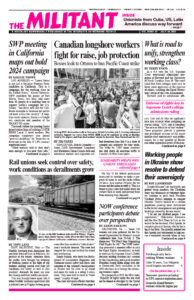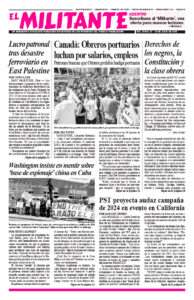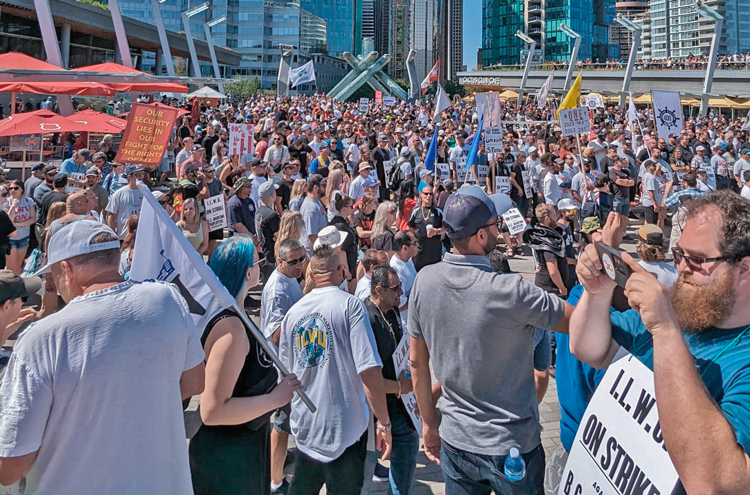VANCOUVER, British Columbia — Some 2,000 International Longshore and Warehouse Union Canada dock and warehouse workers and supporters rallied downtown here July 9 in a show of strength and solidarity for their strike. The strike by 7,400 union members has shut down all maritime traffic at Canada’s 30 West Coast ports.
On July 11 the federal government instructed its mediator to make a proposal of terms to end the strike within 24 hours, then another 24 hours for the bosses and the union to ratify it. This is a threat to pass a law that would force the strikers back to work and prevent them from winning their demands.
“We do not want the federal government to be involved in our business. We must force them [the bosses] to the table,” ILWU Canada President Rob Ashton told the July 9 rally.
Ashton also answered the bosses’ claim port workers are so highly paid that their wage demands should be brushed aside, despite the rising cost of living. “You deserve every penny you get,” Ashton said to cheers from the crowd. The union has pointed to the superprofits shipping companies made during the pandemic, when they jacked up their shipping charges as much as tenfold.
“I am fighting for our kids’ future and everyone that comes after,” Samantha Kailey told the Militant. She was at the rally with her 3-year-old daughter, Farah. “Members before us fought for our rights.” Kailey has worked at the port here for three years driving a tractor-trailer. Her daughter’s sign said, “The ILWU is fighting for my future.”
Several hundred workers joined a rally at the waterfront the next day as well, under the slogan, “One day longer, one day stronger.”
As much as 25% of Canada’s foreign trade passes through the West Coast ports. Vancouver is Canada’s largest. The strike is also having a big impact in the U.S., with some $572 million a day in containers arriving from Canadian ports.
In an important act of international solidarity, U.S.-based ILWU International President Willie Adams announced that union members in the U.S. will refuse to unload ships redirected from Canada to U.S. ports. Already some ships, unable to be unloaded in Canada, have headed back to China.
The ILWU has three main demands: stopping the “erosion” of union work through contracting out, especially of maintenance; protecting jobs in the face of “the devastating impact of port automation”; and ensuring that wages rise in the face of “record high inflation and skyrocketing cost of living.” The union says dock bosses are using outside contractors when union workers are available.
The federal government recently approved a plan to increase Vancouver’s container capacity by nearly 50% by building a semi-automated container terminal on an artificial island near the Vancouver suburb of Delta. The bosses hope this will boost their profits by speeding up the flow of goods, using fewer workers.
Longshore workers are hired as casuals who report in every day to see if there is work. It takes years to become permanent. One striker told this Militant correspondent that after 11 years he still isn’t permanent.
“Many years of waiting on call to get one-off shifts at very short notice,” ILWU President Ashton said in a July 6 press release. “Income is sporadic and the unpredictability of shifts makes it hard to supplement it with other jobs.”
The British Columbia Maritime Employers Association, which represents 49 companies, broke off negotiations July 3, claiming that the strikers’ demands were “unreasonable.” They proposed the ILWU accept binding arbitration, which the union refused. But as their losses mounted, the bosses agreed to return to the bargaining table July 8.
Bosses at major industries impacted by the strike and the provincial governments in Alberta and Saskatchewan have been calling on the federal government to recall Parliament — currently on recess — to adopt legislation to force the strikers back to work.
In 2021, Ottawa enacted back-to-work legislation against 1,150 striking Montreal longshore workers fighting to eliminate schedules forcing them to work 19 days straight out of 21. The contract imposed by the arbitrator left that unchanged.
Widespread solidarity
Workers from many different unions have been joining the picket line. The building trades unions sent a coffee truck to the picket line at the dispatch hall here.
The strikers have received solidarity messages from unions around the world, including International Longshoremen’s Association locals in the east and south coasts of the U.S., and from maritime unions in Turkey, Sri Lanka, the United Kingdom, Japan, Chile and other countries. Delegations from the maritime unions of Australia and New Zealand participated in the rally and visited picket lines in Vancouver.
Machinists, union members from Avcorp, an aerospace company, joined the picket line in Delta July 6. Machinists union Lodge 11 Vice President Roneel Sharma read a message to the strikers. “A few years ago when our members were locked out by our employer, who was demanding many concessions that would have gutted our collective agreement, it was members from many other unions and workplaces, including the Longshore union, that reinforced our picket lines and helped us emerge victorious,” the message said.
“We are going to fight this government if they try to legislate us back to work,” Sussanne Skidmore, president of the B.C. Federation of Labour, told the July 9 rally. To send messages of solidarity, get updates on the strike or join a picket line, visit www.ilwu.ca.


